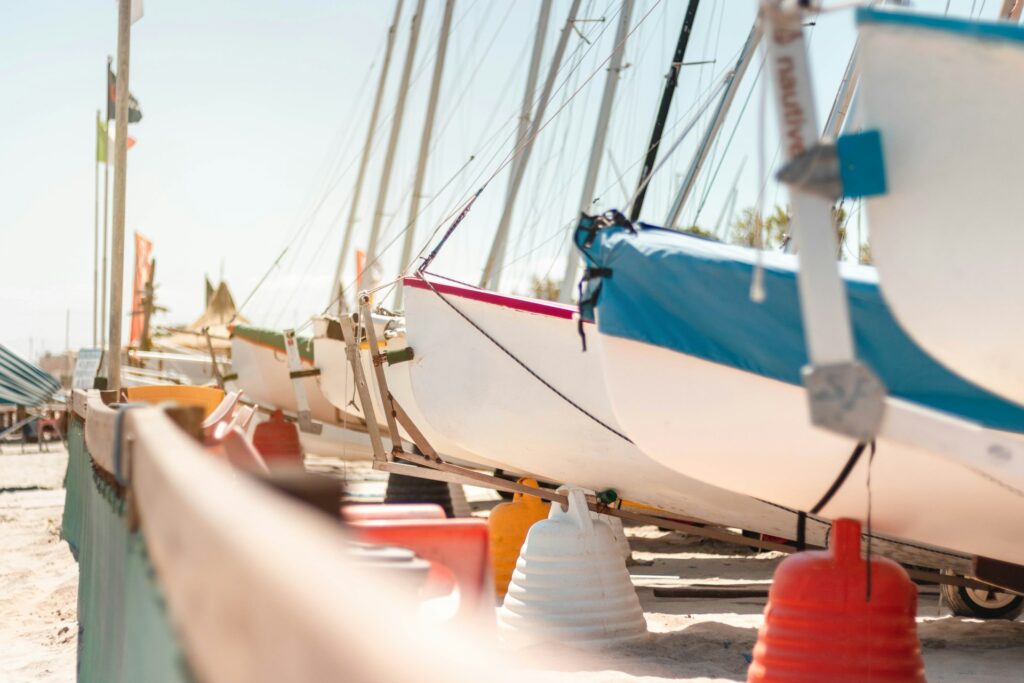Whether you need to register a boat equipped with a trolling motor can depend on several factors, including the type of watercraft and the laws of your state. In general, most states require the registration of all motorized vessels, which often includes boats with trolling motors. The process ensures that vessels are legally recognized, enhancing safety and accountability on the water. Understanding the specific registration requirements for your state is crucial to staying compliant and avoiding legal issues. Boat registration also plays a part in tracking ownership, which can be essential in theft cases or when transferring boat ownership. Therefore, it’s important for boat owners to check with their state’s boating authority to determine if their particular boat with a trolling motor falls under the registration mandate.
Regulatory Overview for Trolling Motor Boats
Regulations for boats with trolling motors vary, with registration often mandated to document and manage the use of watercraft on public waterways. Compliance helps maintain a safe boating environment for everyone.
State-Specific Registration Rules
In the United States, boat registration rules differ by state, and owners of boats with trolling motors should be aware of these variances. Some states may require registration for all motorized vessels, no matter the size or type of motor, while others might exempt certain categories of boats, like those used exclusively on private lakes. It is essential for boat owners to verify their state’s specific guidelines to ensure they meet all legal requirements related to boat registration.
For instance, in states like Florida and Texas, any boat with a motor must be registered, which includes those with trolling motors. On the other hand, states such as California may have different rules depending on the usage of the boat and the type of water it navigates. Non-compliance with these rules can lead to penalties, making it imperative for boat owners to be well-informed about their state’s boat registration statutes.

The Legal Implications of Non-Registration
Failure to comply with boat registration requirements can result in legal consequences that extend beyond simple fines. Non-registration of a boat with a trolling motor may lead to enforcement actions such as citations or impoundment. Additionally, lack of registration can create challenges in establishing ownership, which becomes particularly problematic in the event of theft or when attempting to sell the vessel.
Lack of proper boat registration can also impact insurance claims, as many insurers require proof of registration for policy validation. Owners may find themselves unprotected and unable to claim damages or liability in the absence of valid registration. It’s therefore in the best interest of boat owners to adhere to the boat registration laws of their state to avoid these potential legal and financial risks.
Potential Fines and Restrictions on Waterway Usage
Boat owners who neglect the registration process may be subject to fines that vary by state. These fines are often imposed when unregistered boats are operated or when they are found to be improperly marked according to state regulations. In addition to financial penalties, there may also be restrictions on waterway usage, which could limit access to certain lakes, rivers, or coastal areas for non-registered boats.
Repeated offenses can escalate the severity of penalties, potentially leading to the revocation of boating privileges or even criminal charges in severe cases. To prevent such outcomes and enjoy uninterrupted access to waterways, boat owners should prioritize the completion of their boat registration procedures in a timely manner.
The Registration Process Simplified
The boat registration process typically involves submitting an application, paying a fee, and providing proof of ownership. Authorities will then issue a registration number and decals to be displayed on the vessel.
Necessary Documentation for Boat Registration
To complete boat registration, owners must gather the necessary documentation, which usually includes proof of ownership, such as a bill of sale or title, and a valid form of identification. Some states may also require a hull identification number (HIN) for the vessel, which acts as a unique identifier similar to a vehicle’s VIN. This number is essential for tracking and registration purposes.
Additional paperwork may include previous registration certificates if the boat was previously registered, or manufacturer’s statement of origin for new boats. Providing accurate and complete documentation is critical to ensure a smooth registration process and to avoid any delays or issues with the authorities.
Steps to Register Your Boat with a Trolling Motor
The first step in registering your boat with a trolling motor is to determine the specific requirements set forth by your state’s boating authority. This typically includes filling out a registration application, which can often be done online or by mail. The application will ask for details about the boat, such as make, model, length, and type of trolling motor.
Once the application is completed and the necessary documentation gathered, owners will submit these along with the registration fee to the appropriate state agency. Following submission, the state will process the application and, upon approval, issue a registration certificate and decals to be displayed on the boat. These serve as proof of registration and must be renewed periodically, with renewal intervals varying by state.
Benefits of Registering Your Boat
Registering your boat comes with several advantages that enhance your boating experience. For starters, it establishes legal ownership, which is essential in the event of theft or when selling the boat. A registered boat also ensures eligibility for services such as rescue operations or assistance from marine patrols, as registration data can be crucial in emergency situations. Additionally, registration fees contribute to the conservation and improvement of waterways, supporting environmental initiatives and infrastructure that benefit all boaters.
With registration, boat owners also gain access to information and resources provided by state boating agencies, including safety courses and updates on boating regulations. This can lead to a safer boating environment and help owners avoid inadvertent non-compliance with laws. Moreover, registration may be required for docking at certain marinas or entering particular lakes and coastal areas, granting registered boats greater freedom and access.
Another important benefit is the potential for reduced insurance premiums. Some insurers offer discounted rates for registered boats, as registration can signify responsible ownership and adherence to safety standards. Lastly, displaying registration decals can deter potential theft, as it makes it more difficult for thieves to sell the boat without detection. Overall, boat registration is a small investment that can lead to significant peace of mind and enjoyment on the water.
For those who engage in competitive fishing or other water sports, having a registered boat is often a prerequisite for participation in events. The registration proves compliance with local regulations and ensures the event organizers that all vessels on the water are operating legally. This is not only a matter of formality but also contributes to the overall integrity and safety of sporting events.

Trolling Motors and the Law
Understanding the legal status of trolling motors is essential for compliance with boating laws and regulations, as they often determine whether a boat needs to be registered. In many jurisdictions, the presence of any motor, including a trolling motor, classifies a boat as a motorized vessel. This classification is what prompts the need for boat registration, as the authorities aim to regulate and monitor all motorized watercraft for safety and environmental purposes. Boat owners should confirm their local definitions and regulations to ensure their compliance with the law.
Compliance With Environmental and Wildlife Regulations
Boat registration, especially for boats with trolling motors, is not only about legal compliance but also about protecting the environment and wildlife. By registering your boat, you are also agreeing to follow regulations that help minimize the impact of boating on natural habitats. These may include speed limits, no-wake zones, and restrictions on areas where boating is allowed to preserve sensitive ecosystems.
Additionally, the process of registration can involve inspections that check for adherence to environmental standards, such as proper waste disposal systems or the use of eco-friendly trolling motors. Compliance with these regulations ensures that boating activities do not harm fish populations or water quality, contributing to the sustainability of waterways for future generations of boaters and wildlife alike.
Final Thoughts on Boat Registration Necessities
Boat registration is not just a formality; it’s a vital part of responsible boat ownership. Whether you’re maneuvering a small craft with an electric trolling motor or a larger vessel, adhering to registration requirements ensures that you’re recognized by legal authorities and can be assisted if necessary. It’s important to remember that while this overview provides a foundation, there is unread content and details specific to your area that also need consideration. Ultimately, staying informed and compliant with registration laws keeps you, your boat, and the waterways we all enjoy safer and more enjoyable for everyone.
